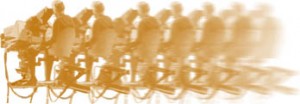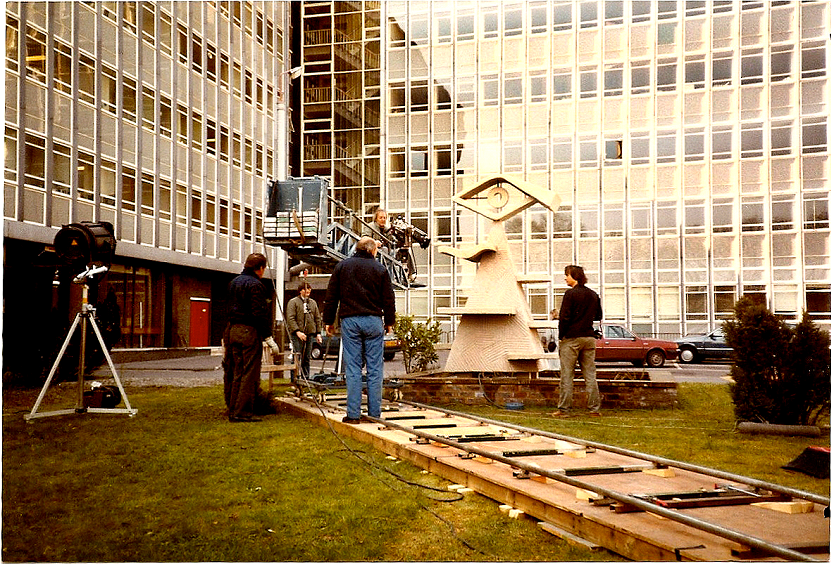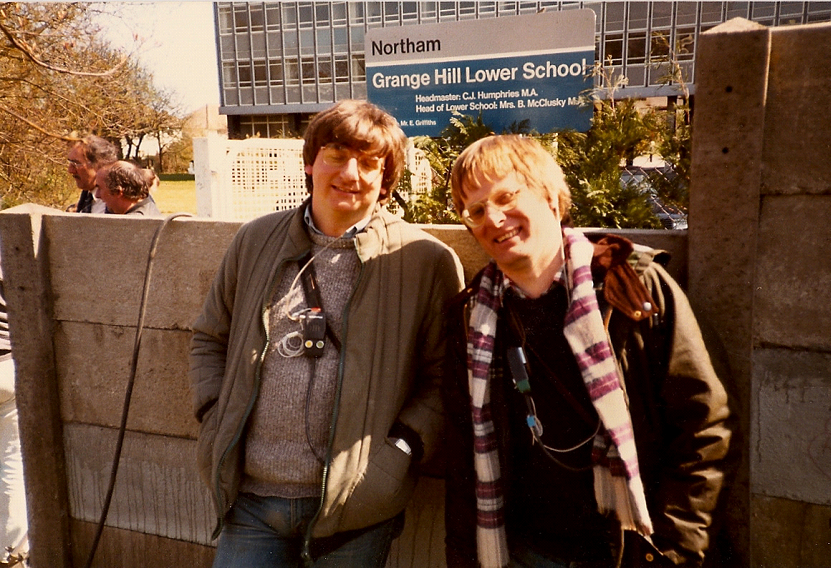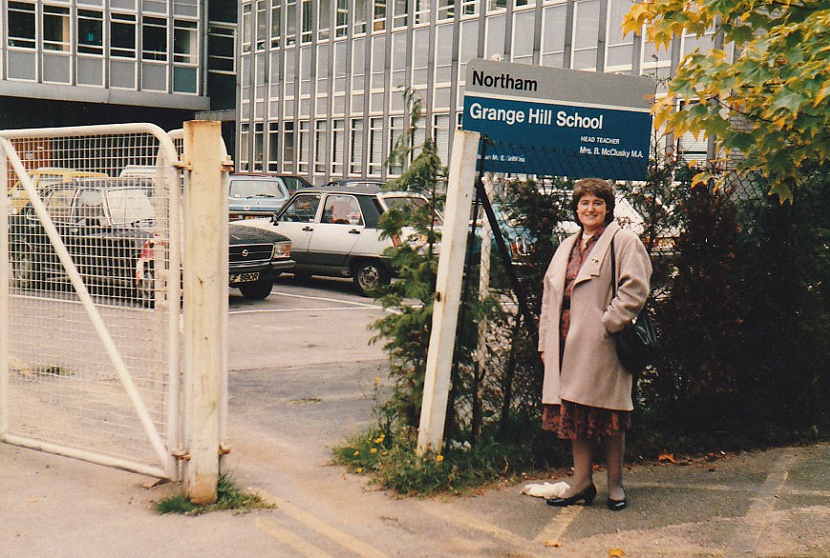This follows on from Bernie Newnham’s post How Things have Changed
Dave Plowman
It never occurred to me to ever look, but seems dangerous having sprinklers in a TV studio full of electrics?
Albert Barber
I went on a visit to the Royal Opera House. The tour was excellent. The whole building is like an entertainment machine, for opera of course, that seems to run like clockwork. Sets are trundled in by a large scene crew they work in shifts starting early till late, there is a lighting rig with one hundred a nine hoists for quick changes, there are six rehearsal rooms a couple of rehearsal rooms with sprung floors for dance and ballet and they transmit live TV performances a wardrobe department……..
…. hang on – I remember an organisation that had a similar facilities and in London. It had a dedicated building specially designed with overnight set and lighting crews, lighting hoists for ease, sprung floor rehearsal rooms and did live television………now where was it? I don’t think Salford – certainly London…..and it ran like clockwork. They even transmitted live television. You could even buy the recordings they made.
Nick Ware
Sadly, I think it was all just a dream, and besides it wouldn’t really work anyway. But the bit about the sprung floors in the Covent Garden rehearsal building brought back one of my worst nightmares! It went like this:
… We (the royal we, as ever) were booked to shoot a masterclass with the most famous Russian ballerina of the day, Natalia Makarova. The shoot would take place in the top floor showcase rehearsal room of the brand new rehearsal building, right next to the ROH. The brief was that it would be just her, with a rehearsal pianist. At unplanned, but appropriate, moments she would stop dancing, sit on the floor wherever she happened to be, and talk to camera. Sounds easy enough, you might think.
But if you thought that, you wouldn’t be taking into account that no-one had mentioned to the two cameramen, which one of them was the Lighting Cameraman, and which was the subordinate of the two. (You need to know now that it was George Gardiner and Henry Marcuzzi, though not necessarily in that order). (Both RIP, BTW).
Somehow, between them, they decided that since the wall that formed the backing for the imminent travesty, was plain and white, they would light it with four 5kW HMI’s placed neatly in the window recesses either side, and blasting directly at the poor ballerina. The deal was, and always had been, that my dear long-suffering colleague Patrick Heigham would operate a Fisher boom for this epic, since radio mics about her minutely petite person were not an option.
Here is where the fun starts: Patrick, seeing the lights going in says to George: "You can’t light it like that, you’ve got four key lights and two cameras both shooting down the keylights. You’ll get four boom shadows. It’s PAGE ONE, that is!"
Meanwhile, I sidle up to Henry and say: "Er, Henry, you have noticed that there are fire sprinklers in those alcoves, right above those HMI’s?". "Oh that’s alright", says Henry, "I’ve done it loads of times, and besides, HMI’s don’t get hot". ( ! )
Cut back to George and Pat: George shouts: "I’m not going to be told what’s page one by a fu**ing boom op!" To which Patrick retorts: "And I’m not going to be called a fu**ing boom op by a fu**ing camera pointer!"
Cut to exterior: We see George running in a rage off down Longacre pursued by the PM (no, not ‘im, the Prod Manager), and Patrick, puce-faced, headed off towards Leicester Square chased by me, ‘cos I couldn’t see how I was going to get out of this mess on my own.
Cut back inside: Bloody Hell, it’s Bedlam! Sure enough, the lights did burst a sprinkler, all four HMI’s have exploded, and the whole floor, camera gear and everything is under water. The local fire brigade are already there yelling: "Where are the effing in-house fire guys, we’ve no idea where to turn the water off".
Director, Derek Bailey, is in a heap in tears on the floor, sobbing: "This’ll finish us, we’re only here on a promise that we look after the place, and they’ve got Princess Anne coming tomorrow night for the Grand Gala Opening of their precious new rehearsal rooms. We’re finished!"
The water had gone through the £100,000 floor and down to the next level, and by now the 5000 gallon tanks in the roof are empty. That’s 5000 gallons under the floor, and no-one knew where it ended up.
Peter Rann, the PM, never put in an appearance again, and was later found drunk in a nearby bar.
Amazingly, they let us back next day, and we finished the shoot, and we never heard a word more about the damage to the two £100,000 sprung floors. So we all lived to tell the tale……
Did I exaggerate enough, or is that about right?
Dave Mundy
Fabulous story: I can picture it all in slow-motion! It’s amazing how some so-called senior staff just don’t listen to their colleagues who have had loads of experience and have useful input to a shoot. I hope the white-glove merchants were suitably chastened (and b*ll*cked) for the disaster. Luckily, ROH forgave and allowed the shoot to retake, many places wouldn’t!
Geoff Fletcher
Wonderful story. It has that terrible inevitability about it which I well remember from some of my own experiences on location. I showed it to my wife who is a life-long fan of ballet, and she remembered Derek Bailey well from her days on Make-Up at LWT so it was doubly interesting to her.
Nick Ware
Patrick and I worked with Derek a good deal. Some of the best times of my career – a true Gent and a privilege to work with. The last time was only a year or so ago, Derek now 82 and still sharp as nails. What a blast from the past!
By the way, the end of the story was that in the end we did it more or less with no lights. Just the natural diffused sunlight coming in and making the shiny new floor shimmer like in a dream scene. Looked stunning.
So you could say the moral of the tale was – Look before you Light.
Pat Heigham
Royal Opera House rehearsal studio:
I do remember the disaster with the sprinklers being activated.
But apart from the misplacing of the HMI keylights, one must remember that a dance studio has one wall which is totally mirrored – like a wide-angle camera looking straight at you. That, and the lights, made conventional boom-operation extremely difficult.
Many of these doco set-ups are unplanned and ‘off-the-cuff’. Nick and I had received exactly the same training, courtesy of BBC Television, and would have been coached in lighting and studio floor planning as to camera/lights/artistes positions.
I don’t now recall who either of the cameramen were – but I don’t think George would have had the same training in lighting for a boom, and I certainly did have more experience.
Henry – well, Henry started out as a Thames camera car driver, and although I was encouraging him in his quest to be a cameraman, he was not man enough to admit his inexperience. I had another unpleasant run-in with HM at a later stage.
As a corollary to this story – I went on to work with a pleasant ex-Glasgow BBC trained mixer (Sandy MacRae) who had formed a shooting facility with a cameraman, who turned out to be Mike Fash, whom I knew well, we were both on Frank Wilkins’ crew at TVC. Sandy once said to me that "Mike will never, ever, give you grief, because he knows you know what you’re doing!" Apart from which, we had both been trained the same way, so that refers back to my earlier point.
When working with lighting cameramen, I would never say, "You can’t put that effing light there!" More along the lines of: "Could you drop/move that 2K key a foot or so, that’ll cast the mic shadow, well out of shot", because I knew full well what that lamp was intended to be doing. (only once was the request denied, for artistic reasons, so I went to my Plan ‘B’ for boom position).
I had the pleasure of working with Freddie Young! On a commercial, admittedly, but he stopped by the sound table and asked who was the Boom Op. Once introduced, he said: "You won’t have any trouble- there are lots of lamps around, but most are picking up things in the background". I stood, as was the necessary procedure, in the artistes’ position and cast an eye. Absolutely standard 3-point lighting – key/back/fill. Perfect!
Which brings me back to the lack of training nowadays, unless there are very good schools offering sensible tutors.
Nick Ware
Don’t worry, Pat, your ability was never in doubt. You were completely right. I too, spent my first couple of years on Crew 2 with Frank and Jim, so I know exactly what you mean. We knew what we were about! Oh, and I didn’t attribute the word effing to you, but you did give as you got from George after he snapped at you. Who could blame you? It was one of those "damn, I wish I’d said that" magic moments!
The thing about George was that normally you could joke all you liked with him, and be very direct with him. He had a generous heart and a unique sense of humour. It’s just that on this occasion, there was an undertow of discontent going on that we hadn’t initially been aware of.
Why the spark allowed the lights under the sprinklers I couldn’t say, but that’s where they were.
Chris Eames
A wonderful story, but it begs me to ask one question. I never worked with a sparks, good , bad, or indifferent, who was not paranoid about automatic fire systems. You could understand that. Nobody ever seemed to know how sensitive they were, and if they were triggered, they would always get the blame! Where were they?
Also, the first bit of good lighting advice I was given when I started on PSC, back in the days of tube cameras, was that not to add light was a valid lighting decision. The only problem you find is that sometimes the being above, providing the light, was prone to have a mind of his own, and turn it off!
Albert Barber
Interesting and entertaining stuff.
Anyone remember lighting, fire sprinklers and “Grange Hill”?
Ian Dow
I suspect Albert was expecting a comment from myself as the “Grange Hill” culprit…….
“Grange Hill” was at the time a “drive in” OB at BBC Elstree (I think Studio A?) using a 3 camera unit, which could also drop the studio cables and quickly go out to do location shoots.
My lighting position was in the old Lighting Gallery where I could watch the monitors and direct the sparks from a comfy chair. The classroom set had the usual venetian blinds as there was no room (or money!) for a photo backing, and I was using a 5K to cast sunlight through the blinds into the set. In an attempt to bring a bit of professionalism into the whole debacle I was instructing the sparks by radio to move the lamp to get the desired effect – up a bit, back a bit more, a touch to the right. Got it!
We ran to record, then on camera there seemed to be some hiatus on the studio floor, accompanied by a strange hissing noise. Out of interest I ambled out onto the top of the staircase to investigate and saw that the kids were running in all directions, and looked rather muddy and wet. I went down the iron stairs to see if I could help, and to my horror then saw that I had carefully directed the sparks and his 5K to move back under the corner gantry in the studio – and position it directly under a sprinkler head.
Chaos ensued as gallons of rusty water poured into the studio. In a futile attempt to direct the water into a sink I climbed a step ladder and the sparks handed me a length of fire hose which I tried to hold over the sprinkler head, but only achieved getting myself covered in more water. Then we heard the two tone horns as three fire engines careered down the covered roadway drowning out the News Bulletin from Newsroom Southeast which was on air. The water had to go somewhere and it chose to run through the underfloor cable ducts into the adjacent Studio B, also bringing that production to a halt. Wardrobe mopped down the kids as best they could, and the production team frantically rescheduled the next two days to shoot all the scenes in the playground whilst the studio was dried out and made safe.
I returned to my chair in the Lighting Gallery where I contemplated the full horror of the situation and my part in it, mentally composing a letter of resignation. The door from the corridor opened and there stood the Producer. My heart sank even lower into my boots and I waited for a tirade of abuse. “It’s only television”, he said, and closed the door and left.
Albert Barber
These things do happen by the best, with the best intentions. Everyone who worked on “Grange Hill” was excellent. Such a good team of people and despite the odd foible taught me so much and kept me sane at a time when the BBC was beginning to change for the worse.
The Management in all production departments seemed to me to be insecure and under pressure. My own head of department was at that time not the best at encouraging us and I suspected, probably untrue, that “Grange Hill” was to be ditched to save money. However under my watch and with a brilliant team it kept the figures high and survived a few more years. For what it achieved it was a well run and not too expensive a programme, but Phil Redmond couldn’t keep it going when it was sold off to Liverpool.
Good times, good team and good fun but only in part for me personally keeping the team from the Management. My role in fact.
Best and thanks to all who trod the playgrounds of Elstree.
Tony Crake
Pictures from the First day of First Series of Grange Hill as an "OB" at Elstree… 1984.
(Click on the pictures below to see larger versions:
use your Browser’s BACK button to return to this page)
Paul (?) and Tony Crake:
Dave Buckley
Having seen some tech photos of GH, here’s one of my future wife standing at the ‘front’ of the ‘school’ in July 1986.
(Click on the picture below to see larger version:
use your Browser’s BACK button to return to this page)
She was working for Strathclyde Education department at the time and (Albert please note) told me that GH was compulsory viewing by teachers in the area as what happened in GH happened later in the schools!
Albert Barber
We used to survey schools throughout the country every year and our stories were based on what happened in them, not the other way round. My daughter, my brother and his wife were all teachers and they told me some stories at schools.
It was a misconception that things happened on the programme and then at schools. Often worse things happened at schools that we couldn’t transmit. In comfortable southern counties things never happened like that…. and the way they spoke was never like “Grange Hill”. Some people never lived either.
It always grieved me that the idea that “Grange Hill” was a bad influence because we always tried to be responsible and reflect the times. We even did a story whereby people had to reapply for the jobs they were doing already so that the management could pay them less, a not unfamiliar story in radio and TV media worlds.
The story that was frowned upon by many at first (including the Mary Whitehouse lot) was about Teenage Pregnancy: we got the stories from schools, where they were often hushed up. In the light of recent government and social initiatives we were ahead of the game in trying to prevent these unwanted pregnancies.
We even had letters at the end of the story telling us that we had done well in highlighting a problem. These letters were from welfare workers and teachers plus pupils who had got themselves pregnant. They all said we had highlighted a problem and it could be a warning to others. Phil Redmond who as a clean Catholic boy was against the story too but his wife said we had to do it. Phil was very supportive towards the end of the story and said he was standing in a queue and overheard couple saying how important a story it was.
Strathclyde had many drug related issues too and when we went to Glasgow it was a big problem there. “Grange Hill” also did much to highlight that too with the ‘Just say No’ campaign.
Brian Curtis
Though I started my career working for the BBC, when I left I became an English and Drama teacher working in a "challenging" comprehensive secondary school in Croydon. I often watched “Grange Hill”, whenever I got a chance, and often found the story lines and content reflected the situations I was meeting on an almost daily basis in the school I taught in. Also the characters both teachers and pupils in the series reflected the "types" of people I knew in my school (though some were a bit more "extreme" for dramatic purposes!)
I think the only criticism that I and colleagues ever really voiced was that there did not seem to be "as much litter" in the corridor shots as there was in the corridors of "the real school"!
I still do some supply teaching work in schools on the Isle of Wight and still encounter both the litter and the story line situations!






